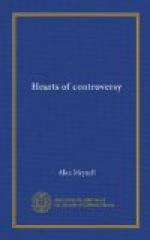But it is not only such a platitude of observation, such a cheap generality, that is silenced in the presence of the poet whose name is at the head of these pages. For if ever Nature showed us a poet in whom our phrases, and the judgements they record, should be denied, defeated, and confused, Swinburne is he. We predicate of a poet a great sincerity, a great imagination, a great passion, a great intellect; these are the master qualities, and yet we are compelled to see here—if we would not wilfully be blind or blindfold—a poet, yes, a true poet, with a perfervid fancy rather than an imagination, a poet with puny passions, a poet with no more than the momentary and impulsive sincerity of an infirm soul, a poet with small intellect—and thrice a poet.
And, assuredly, if the creative arts are duly humbled in the universal contemplation of Nature, if they are accused, if they are weighed, if they are found wanting; if they are excused by nothing but our intimate human sympathy with dear and interesting imperfection; if poetry stands outdone by the passion and experience of an inarticulate soul, and painting by the splendour of the day, and building by the forest and the cloud, there is another art also that has to be humiliated, and this is the art and science of criticism, confounded by its contemplation of such a poet. Poor little art of examination and formula! The miracle of day and night and immortality are needed to rebuke the nobler arts; but our art, the critic’s, mine to-day, is brought to book, and its heart is broken, and its sincerity disgraced, by the paradoxes of the truth. Not in the heavens nor in the sub-celestial landscape does this minor art find its refutation, but in the puzzle between a man and his gift; and in part the man is ignoble and leads us by distasteful paths, and compels us to a reluctant work of literary detection. Useful is the critical spirit, but it loses heart when (to take a very definite instance) it has to ask what literary sincerity—what value for art and letters—lived in Swinburne, who hailed a certain old friend, in a dedication, as “poet and painter” when he was pleased with him, and declared him “poetaster and dauber” when something in that dead man’s posthumous autobiography offended his own self-love; when, I say, criticism finds itself called upon, amid its admiration, to do such scavenger work, it loses heart as well as the clue, and would gladly go out into the free air of greater arts, and, with them, take exterior Nature’s nobler reprobation.




